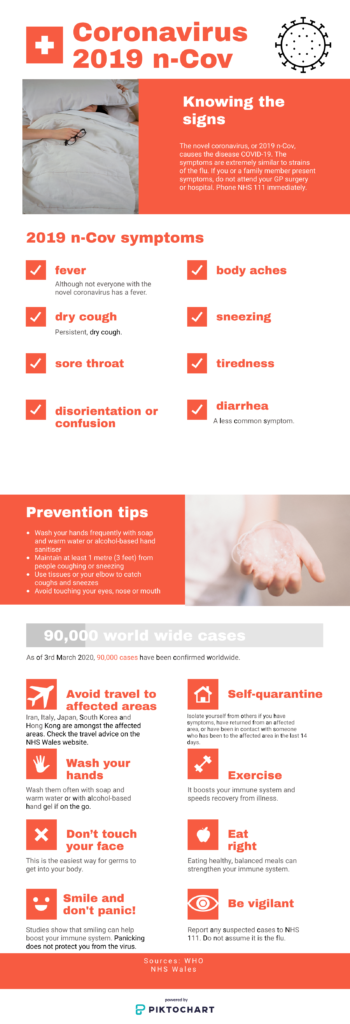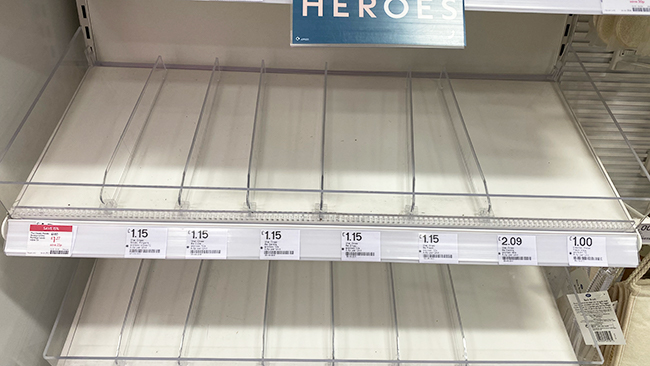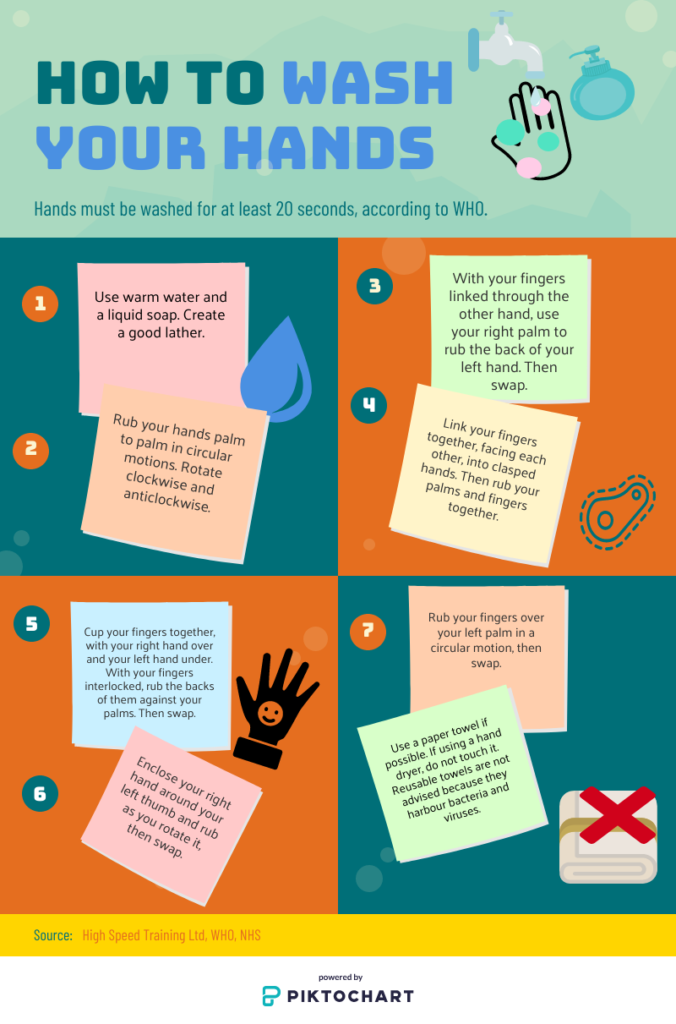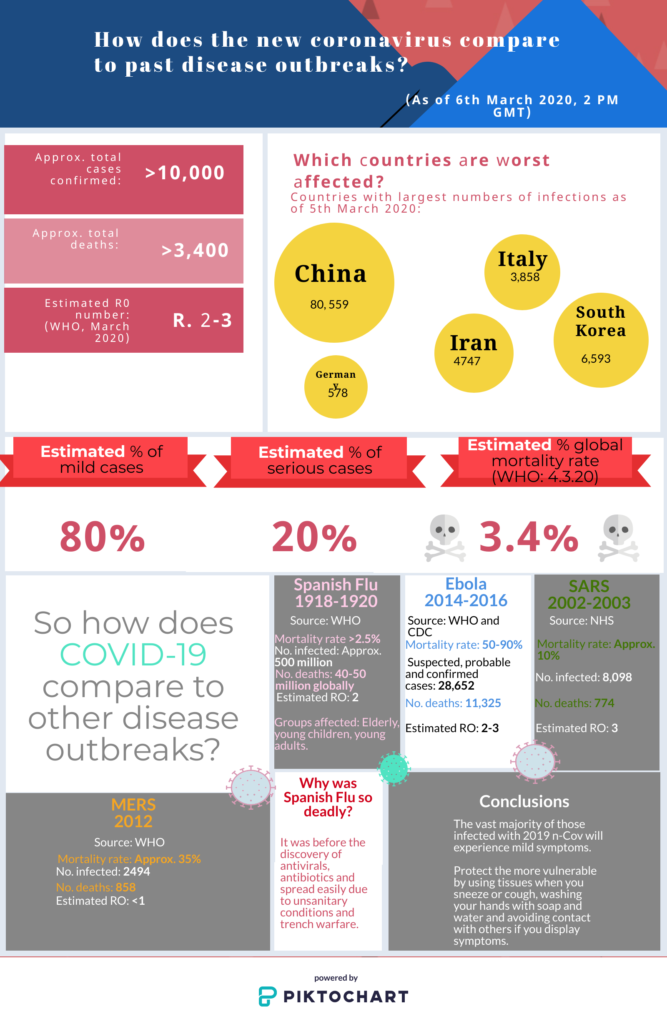The second case of the novel coronavirus has been confirmed in a Cardiff patient. What is the current plan to prevent a Welsh epidemic?

The spread of the novel coronavirus, 2019 n-Cov, is fast becoming a global health concern amidst international efforts to contain it.
Two Welsh cases have been confirmed, one in Swansea and another in Cardiff. Currently, there at least 116 cases across the UK.
Yesterday it was announced that a patient living in England had become the first within the UK to die from the virus. The patient is thought to have been elderly with underlying health conditions.

In Wales, the first announced case created panic, with bottles of hand sanitiser gels disappearing overnight. One employee at Boots in Swansea described customers coming to the tills with “upwards of ten bottles of gel and soap.”

Dr Nicola Purdy, a medical researcher who lives in Swansea near the first confirmed Welsh case, said she isn’t “particularly worried about the virus” at this point.
“I would just like to know what is being done to prevent its spread,” she said.
Both Welsh patients had recently returned from northern Italy and are receiving specialist care.
After the news that the Welsh patients had returned from Italy and that the first UK death had no recent travel to an affected area, many feel that the government isn’t doing enough to advise or protect people.
“They’re advising self-isolation at home if you have symptoms,” said one Swansea resident, who wishes to remain anonymous. “But what about those of us who live with immunocompromised or elderly relatives? There is no guidance for us.”
“Telling people to self-isolate hasn’t worked. We’re being told that the virus spread is inevitable now when it is too late.”
How are Welsh authorities responding to the virus threat?
The Welsh Government published specific guidance for schools in February on containing the virus spread.
As with the rest of the general public, students, staff and school visitors should avoid touching their faces after they’ve touched surfaces that are unclean (particularly on public transport), stay at home if they feel unwell and catch, bin and kill the virus with tissues.
Additionally, the Welsh Government recommends that school pupils, staff and visitors should wash their hands with soap and water or hand sanitiser with an alcohol content over 60%:
- Before leaving home
- When they get to school
- After using the toilet
- After breaks and PE or sporting activities
- Before food preparation
- Before eating any food – even snacks
- Before leaving school
A Public Health Wales spokesperson said that Welsh local authorities “will have been advised” to regularly replenish supplies of alcohol-based hand sanitiser gels in schools.
Swansea Council said that they are providing guidance to schools based on the “latest professional advice from Public Health Wales”, but did not comment on whether hand sanitiser gels would be available across Swansea schools.
Cardiff Council were unavailable for comment.

The Welsh Government have been closely involved with other governmental and health authorities in order to plan against an epidemic.
On 3rd March, a Welsh Government spokesperson said, “The First Minister and Health Minister both took part in the COBRA meeting and we are continuing to work closely with the UK Government on coronavirus planning.”

“A UK action plan, which we have supported, is being published today,” he said.
The action plan included a comparison of other epidemic and pandemic diseases, including the deadly Spanish Flu pandemic and the SARS oubreak of 2003.
Additionally, it set out a four-step strategy for the government’s response to a virus outbreak in the UK:
- Contain: Detection of early cases and their recent contacts.
- Delay: Slow the virus’ spread; attempt to stop it peaking in the winter months.
- Research: Invest in research for treatments, potential vaccines and understanding of the virus and the best preventative actions.
- Mitigate: Provide the best care available for patients and support hospitals to provide services, minimising impact on communities, society and the economy.
The plan states that NHS staff – including those in Wales – have had training in virus containment and prevention and that the UK is “well prepared” to tackle an outbreak.
Whilst information about the precise measures being taken by the Welsh NHS is not readily available to the public, a Welsh NHS source said that some health boards are planning to hire nurses to assess suspected virus patients.
The nurses will assess patients at home in order to ensure that cases are relatively isolated.
Additionally, more NHS staff will be trained in the use of protective equipment in the case of virus spread within hospitals and meetings will be held regularly to discuss any new cases.
Currently, it is estimated that each person with the virus will infect around 2-3 others (called an RO number), with a mortality rate of around 3.4%. However, this rate is likely to drop as more cases are reported.

It is expected that the UK Government will formally announce that the UK has moved into the ‘delay’ phase of the virus action plan shortly, after cases passed the 100 threshold.
This means that authorities across the UK, including in Wales, will consider measures to slow the spread of the virus. However, it is not clear yet what they will agree on implementing.
It is likely that positive cases during an outbreak in Wales, as well as in the rest of the UK, will not be put in medical isolation if their symptoms are mild. This is because resources will be needed to care for more severe cases.
However, we are still at a relatively early stage and it is difficult to tell what will be agreed by Welsh authorities if cases rise here.
At the moment, the best way to prepare for a coronavirus outbreak is to listen to official advice.
Practice good hand hygiene, avoid touching your face after being in contact with potentially contaminated surfaces and stay at home if you develop symptoms.
Most importantly, listen only to official advice and don’t panic, no matter what you read online.
